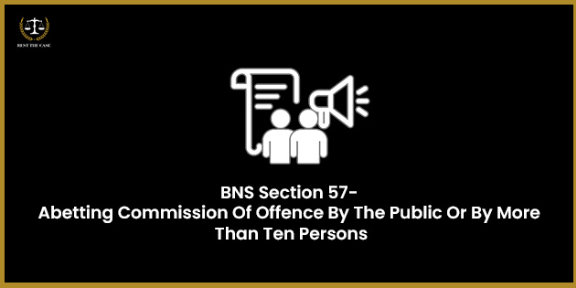BNS
BNS Section 57 - Abetting Commission Of Offence By The Public Or By More Than Ten Persons

BNS Section 57 deals with the crime of encouraging or helping a large group of people (more than ten) or the general public to commit an offense. If someone instigates or abets such a group to commit a crime, they can be punished under this section. This law recognizes that crimes involving big groups or public assemblies can have a greater impact on society and thus deserve stricter punishment. The section also modernizes the earlier law in the Indian Penal Code (IPC) by increasing the maximum punishment and simplifying the language to make the law clearer and more effective. BNS Section 57 corresponds to IPC Section 117 but carries harsher penalties to discourage public disorder and large-scale unlawful acts.
Based on the article provided, here are the keywords and topics formatted in the requested structure.
What We’ll Explore in This Blog:
- The legal provision and simplified meaning of BNS Section 57
- Legal Provisions of Section
- Key changes and stricter penalties in BNS Section 57 compared to IPC Section 117
- Punishment for instigating public disorder and unlawful acts
- Practical examples illustrating BNS Section 57
- Applicability of the law (cognizable, bailable, and court jurisdiction)
- The impact of BNS Section 57 on public safety and law enforcement
Legal Provision
Whoever abets the commission of an offence by the public generally or by any number or class of persons exceeding ten, shall be punished with imprisonment of either description for a term which may extend to seven years and with fine.
Illustration:
A displays a placard in a public area, urging a group of more than ten people from a certain community to gather at a specific time and place to attack members of a rival community during a procession. In doing this, A has committed the offense described in this section.
Simplified Explanation of BNS Section 57
Aspect | Explanation in Simple Words |
|---|---|
Offense | Encouraging or helping the public or a group of more than 10 people to commit a crime. |
Punishment | Jail for up to 7 years (which can be with or without hard labor) and a fine. |
Cognizable or Non-cognizable | Depends on the original offense abetted. If the original crime is cognizable, this is too. |
Bailable or Non-bailable | Depends on the original offense. If the original crime is bailable, so is this; if not, then not. |
Court Triable By | The same court that would try the original offense committed by the public or group. |
Practical Examples Illustrating BNS Section 57
- Example 1: A person puts up posters calling more than ten people from a community to attack another group during a festival. Even if the attack does not happen, the person can be punished under this section.
- Example 2: Someone encourages a crowd of more than ten protestors to vandalize public property. If the act is carried out or even if not, the person inciting can be held liable.
- Example 3: A leader urges a large group to block traffic illegally. This act of urging is an offense punishable under this section.
Key Improvements and Changes: IPC Section 117 to BNS Section 57
Aspect | IPC Section 117 | BNS Section 57 |
|---|---|---|
Maximum Punishment | Up to 3 years imprisonment, or a fine, or both | Up to 7 years imprisonment (hard or simple) plus a fine |
Language | Older and formal legal wording | Modern, simpler, and clearer language |
Punishment Scope | Less severe | Increased punishment reflecting the public impact |
Clarity | Basic explanation | Clearer definition and examples |
Focus on Public Safety | General abetment provision | Stronger penalty for group/public-related offending |
Frequently Asked Questions
Q1. Why was IPC Section 117 revised and replaced with BNS Section 57?
To modernize the law with clearer language and increase penalties for offenses involving groups or public gatherings that can disrupt public order.
Q2. What are the main differences between IPC 117 and BNS 57?
BNS 57 increases the maximum imprisonment from 3 to 7 years and uses simpler wording while keeping the core principle of punishing abetment of offenses by large groups or the public.
Q3. Is BNS Section 57 a bailable or non-bailable offense?
It depends on the offense abetted. If the abetted offense is bailable, this offense is bailable; if not, then it is non-bailable.
Q4. What is the punishment for abetment under BNS Section 57?
Imprisonment for up to seven years (either rigorous or simple) and a fine.
Q5. What is the fine imposed under BNS Section 57?
No fixed amount; the fine is decided by the court based on the case.






